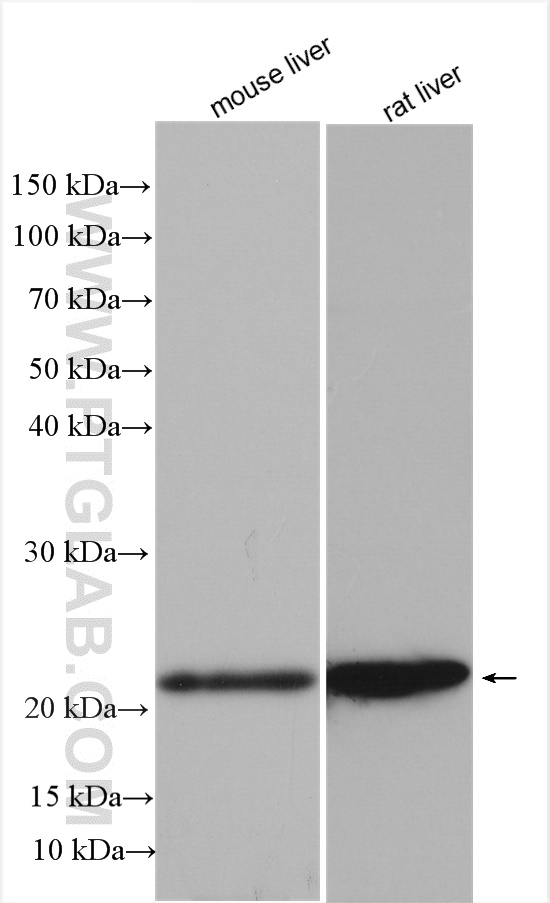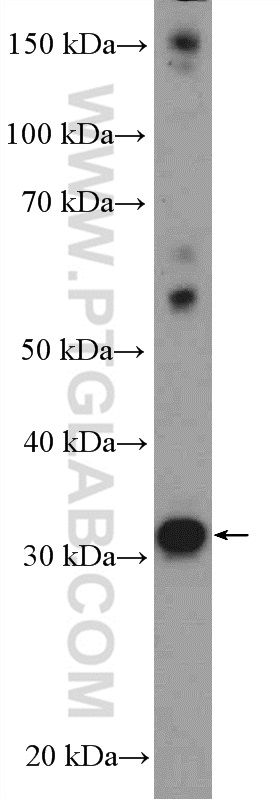验证数据展示
经过测试的应用
| Positive WB detected in | mouse liver tissue, L02 cells, HeLa cells, rat liver tissue |
推荐稀释比
| 应用 | 推荐稀释比 |
|---|---|
| Western Blot (WB) | WB : 1:500-1:1000 |
| It is recommended that this reagent should be titrated in each testing system to obtain optimal results. | |
| Sample-dependent, Check data in validation data gallery. | |
产品信息
20711-1-AP targets FGF-8 in WB, IHC, IF, ELISA applications and shows reactivity with human, mouse, rat samples.
| 经测试应用 | WB, ELISA Application Description |
| 文献引用应用 | WB, IHC, IF |
| 经测试反应性 | human, mouse, rat |
| 文献引用反应性 | human |
| 免疫原 | Peptide 种属同源性预测 |
| 宿主/亚型 | Rabbit / IgG |
| 抗体类别 | Polyclonal |
| 产品类型 | Antibody |
| 全称 | fibroblast growth factor 8 (androgen-induced) |
| 别名 | FGF8, Heparin-binding growth factor 8, HBGF-8, Fibroblast growth factor 8, FGF 8 |
| 计算分子量 | 27 kDa |
| 观测分子量 | 24 kDa |
| GenBank蛋白编号 | NM_006119 |
| 基因名称 | FGF8 |
| Gene ID (NCBI) | 2253 |
| RRID | AB_10733225 |
| 偶联类型 | Unconjugated |
| 形式 | Liquid |
| 纯化方式 | Antigen affinity purification |
| UNIPROT ID | P55075 |
| 储存缓冲液 | PBS with 0.02% sodium azide and 50% glycerol , pH 7.3 |
| 储存条件 | Store at -20°C. Stable for one year after shipment. Aliquoting is unnecessary for -20oC storage. |
背景介绍
FGF8, also named as AIGF and HBGF-8, belongs to the heparin-binding growth factors family. FGF8 stimulates growth of the cells in an autocrine manner. It mediates hormonal action on the growth of cancer cells. Defects in FGF8 are the cause of Kallmann syndrome type 6 (KAL6). Defects in FGF8 are a cause of idiopathic hypogonadotropic hypogonadism (IHH). The antibody is specific to FGF8.
实验方案
| Product Specific Protocols | |
|---|---|
| WB protocol for FGF-8 antibody 20711-1-AP | Download protocol |
| Standard Protocols | |
|---|---|
| Click here to view our Standard Protocols |
发表文章
| Species | Application | Title |
|---|---|---|
Carcinogenesis The oncoprotein HBXIP enhances angiogenesis and growth of breast cancer through modulating FGF8 and VEGF. | ||
Oncoimmunology Immunoreactivity against fibroblast growth factor 8 in alveolar rhabdomyosarcoma patients and its involvement in tumor aggressiveness. | ||
Oncol Lett Systematic analysis of expression profiles and prognostic significance of the FGF gene family in pancreatic adenocarcinoma |



